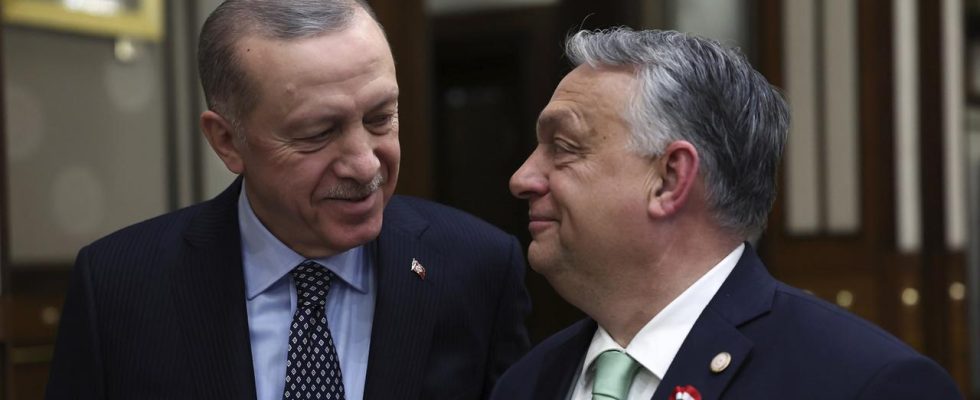Hungary’s Prime Minister Orban had stood firmly on Turkey’s side during the month-long blockade of Sweden’s NATO accession. Then came Erdogan’s about-face. Orban is now following suit. Why is that easy for him?
Now suddenly everything has to go very quickly. Hungarian Prime Minister Viktor Orban and the Hungarian parliament do not want to be the last to approve Sweden’s NATO membership. Just a few weeks ago, Orban was still on the brakes and loyal to Turkish President Recep Tayyip Erdogan, who for a long time refused to allow Sweden to join NATO. Erdogan only gave up his resistance at the NATO summit in Vilnius this week.
It was clear that this would happen. At a meeting with Austria’s Chancellor Karl Nehammer in early July, Orban declared that his government had no objections. The Swedes would only have to wait for the ratification of the Hungarian parliament. A classic ambiguity of the prime minister. Because the approval of the parliament is actually no obstacle in Hungary. According to Orban, laws were passed in parliament overnight.
After the dramatic turnaround in Vilnius, however, Orban found himself under pressure because the opposition party Momentum had already collected signatures for a special session of parliament. In Orban’s understanding of power, it is inconceivable that the opposition would set the pace for him.
Targeted tit-for-tat
The tussle over NATO membership shows how Orban thinks and acts. His motive for refusing to consent to the Swedes was not based on military grounds. It was the anger at criticism from Sweden about Hungary’s deficits in the rule of law and freedom of the press and the handling of EU funds.
Because of suspected corruption, the EU is blocking billions that Hungary is actually entitled to. When Sweden held the EU Council Presidency in the first half of 2023, Orban saw the opportunity to settle scores. Motto: If you block my funds, I will block your NATO entry.
Blockade as a political model
Above all, the blockade hits the EU. Wherever possible, Orban veers away and refuses to consent. He said no when it came to sanctions against Russian Orthodox clergy and he recently refused military ones Aid to Ukraine for the war against Russia.
Occasionally he even snubs his few remaining supporters. Finally, Austria had to find out. Although the Austrian federal government, like Orban, calls for more action by the EU against illegal migration, Orban released hundreds of people smugglers convicted of human trafficking from Hungarian prisons in May.
Officially, the government justified this with the high costs. In fact, it may have been a punitive reaction against the EU because of the blocked funds.
enemy of the EU
The European Union is Orban’s favorite enemy. At home in Hungary, he uses every opportunity to present it as the den of all evil. Again and again the government calls for – non-binding – referendums in which citizens are supposed to give their opinion on EU initiatives or decisions. It was also asked whether the citizens agreed with the EU sanctions that Hungary had previously decided on. But the government hid that.
When Orban, Austria’s Chancellor Nehammer and Serbian President Aleksandar Vucic recently met in Vienna for a migration summit, Peter Filzmaier, a political scientist at Danube University Krems, assessed it as a joint search for external “enemy images” of states with major internal problems.
One of these enemy images is the EU. According to Filzmaier, the declaration that one wants to fight irregular migration is “absurd” because nobody is in favor of illegal immigration. This would “rather shamelessly” mix up the issues of immigration and asylum.
Shining light of the ultra-conservatives
Orban enjoys a reputation as a torchbearer among conservative populists. Last year in Texas he gave the opening speech of the “Conservative Political Action Conference”, a gathering of staunch national conservatives. Donald Trump praised him enthusiastically.
Orban is seen by many as the one who fights for conservative values in Europe, especially for the traditional family model. The ultra-conservatives like the fact that he supports families with tax money and excludes people with a different sexual orientation.
Orban’s choice of words is often belligerent. Last year he railed against the decadent western EU states, which would tolerate too many immigrants and allow their Western culture to perish.
Hungary doesn’t want this mixture, they don’t want “multiracial people,” said Orban at the “summer university” for the Hungarian minority in Tusványos, Romania. The meeting is being organized by Orban’s Fidesz party.
Anchoring “Orbanism” in society
At home, Orban is doing everything to anchor his political beliefs and political system firmly in society. The rural population largely follows him, also because Orban’s apparatus controls almost 80 percent of the media.
In spring it became known that the Budapest Mathias Corvinus Collegium (MCC), which is considered Orban’s cadre factory, acquired a private university in Vienna. The new owner wants to train students from all over Europe on the Kahlenberg. It is supposed to be an academy for the conservative elite.
Alongside this, the MCC Foundation acquired one of the largest Hungarian book publishers last month. The pro-government Internet platform “Hungary Today” rated criticism of this as “completely foreseeable international outrage” in line with the Hungarian government’s worldview, which was fueled by “well-known left-wing media” and which used the change of ownership “for their regular anti-Hungarian propaganda”.
In this way, Orban continues to consolidate his power. The fact that he has to make abrupt changes – as in the case of Sweden’s blocking of NATO accession – is part of his political style.

